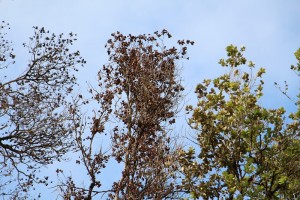DOA: Permit Conditions for Transport of Soil Approved
As part of efforts to reduce the spread of rapid ohia death, the Hawai’i Department of Agriculture has had a ban on the removal of ohia parts and soil from the Big Island for inter-island transport since last August.
On Tuesday, the Hawai’i Board of Agriculture approved permit conditions for the transport of soil.
Potted plants that are “soil-free” can be transported between islands, but any plant with soil will not be allowed without a permit.
The board voted to approve permit conditions for soil removal from the Big Island, which include the following:
- Obtaining an interisland permit from the HDOA;
- Soil is subject to testing for ROD or the shipper must be an active participant in HDOA’s Plant Quarantine Branch (PQB) compliance program, which involves periodic testing and inspections;
- All shipments must be accompanied by a certificate of inspection from HDOA, an interisland permit, and an invoice or packing list;
- Shipments must be clearly labeled as “Soil from Hawai’i Island” or “Soil Samples from Hawai’i Island for Research and Analysis,” and “This Parcel May Be Opened and Delayed for Agricultural Inspection;” and
- Shipments are subject to post-arrival inspection by a PQB inspector.
Other conditions involve required shipper’s identification and contact information and required reporting of any disease outbreaks related to the shipment.
“The board took under serious consideration the impact of restrictions on the movement of soil from Hawai’i Island and the majority felt that this action needs to be taken to help prevent the spread of this disease to uninfected islands,” said Scott Enright, chairperson of the Hawai’i Board of Agriculture. “Our team at Plant Quarantine will work closely with those who use soil in potted plants to help mitigate any adverse impact on the nursery industry.”
In August 2015, an emergency quarantine was issued by HDOA to stop the spread of the plant fungus from the Big Island to other islands.
Within the quarantine, the transport of ohia plants and plant parts is prohibited, including flowers, leaves, seeds, stems, twigs, cuttings, untreated wood, logs, mulch greenwaste, and frass, along with soil on the island.
Anyone who violates the quarantine rule may be charged with a misdemeanor and fined no less than $100, with a maximum fine of $10,000. For a second offense committed within five years of a prior conviction under this rule, the person or organization will be fined no less than $500 and no more than $25,000.
During the Merrie Monarch Festival period, HDOA Plant Quarantine inspectors have printed a travel alert that is available at airports statewide. The card explains the quarantine and what travelers should and should not do.
ROD, also known as ohia wilt, was first noticed in 2010 in Puna. In 2014, the fungus was identified as Ceratocystis fimbriata by researchers at USDA-ARS. In 2014, it was estimated that the disease covered approximately 6,000 acres from Kalapana to Hilo and exhibited tree mortality rates of more than 50 percent. Currently, it is estimated to infect about 34,000 acres. So far, the disease has not been found on other islands. It is not known how the disease entered the state or where it came from.
Individuals interested in more information regarding inspection information should call HDOA’s Plant Quarantine officers in Hilo at 974-4141 or Kona at 326-1077.















